- Home
- Marie Ferrarella
Searching for Cate Page 32
Searching for Cate Read online
Page 32
The Journey to Rainbow’s End
A long, long time ago, so long that no one remembers just when, First Woman the Goddess was created—she was fully grown in four days. She was so beautiful that all the Dine (Navajo) braves were in love with her. But she did not love any of them, only the handsomest of them all, Sun-God. However, she did not think that he even noticed her.
But he did. One day, when she was alone, he came up behind her and tickled her neck with a large, feathery plume. Immediately, she felt as if she was surrounded with warm sunshine. In this magical way, she became Sun-God’s wife. He was the father of her first child, a son.
Soon afterward, First Woman was sleeping beneath an overhanging cliff, and a few droplets of water fell on her. They were from Water-God. This was the way he fathered her second child, also a son. Because the boys were born so close together, everyone called them the Twins of the Goddess. All three lived in a beautiful canyon together.
It was a time when giants roamed the earth and one such giant was Great Giant, who was very evil. He ate every human who came across his path. When he saw First Woman, his heart was so taken with her that he did not eat her, but loved her. But she would have nothing to do with him.
Great Giant was very jealous of her. She knew he would eat the Twins if he saw them, so one day, when he was coming, she quickly dug a hole in the middle of her hogan and hid her sons. She covered the opening by putting a flat sandstone rock on it, then spread dirt over it. That day, the Great Giant did not find her children.
Another day, Great Giant came and saw small footprints around the hogan. He demanded to know where the children who made them were and if they were hers.
Brave First Woman told him she had no children. When he wanted to know who had made the prints, she said she had. She told him that she was lonely for children, so she made the prints herself with the heels of her hand and the tips of her fingers and pretended they belonged to her children. Great Giant believed her and went away.
As the Twins grew bigger, First Woman knew she could not hide them much longer. She prayed for help, and the Spirit who had made First Woman appeared with a bow made of cedar wood for Sun-God’s child. She told her son that it was time for him to learn how to hunt.
First Woman told Sun-Child that he had to make another bow and arrows for his brother. Sun-Child said this was good and that he and his brother wanted to hunt for his father. He asked First Woman who his father was because all this time, he did not know. It was time for him to know and she told him that his father was Sun-God and that he lived far away in the East.
A bow and many arrows were made for Water-Child, as First Woman had asked. The Twins began their long journey to find Sun-God, but they could not find him and returned to their mother.
“If he is not in the East, he must be in the South,” she told her sons, and they went on another long journey to find him. But again, they did not find him and had to come home. First Woman told her sons to look to the West and if Sun-God was not there, then they must try to find him in the North. She did this to keep them safe because if they were on their journey, Great Giant would not find them here with her.
But finally, the Twins returned very unhappy because they could not find Sun-God in any of the places that First Woman had sent them. They thought their mother was lying to them. When she saw how upset they were, she told them the truth. She said that their fathers, Sun-God and Water-God, live far away in the middle of the great Western Water. The journey there was dangerous. The trail went through great canyons where the walls of the cliffs clapped together and could crush them as they passed.
And even if they made it through the great canyons, they would not be able to cross the Grand Canyon and certainly never be able to cross the water to reach their father’s house in the middle of the Western Ocean.
But the Twins insisted, so she taught them a song of protection. The words of the song were “We are traveling in an Invisible Way to seek our fathers, the Sun-God and the Water-God.” This she told them to sing four times, because four was the magic number.
The Twins sang the song each day as they traveled. One day, as they were walking, they saw a small hole in the ground and heard someone say “Ssh!” four times. When they looked into the hole, they saw that Spider Woman was there, beneath the earth. She told the Twins not to be afraid of her. She was their grandmother and welcomed them into her home, but the hole was very small and the Twins said they could not fit through it. Spider Woman told them to blow once toward the East, once toward the West, once toward the South and then once toward the North. They did as she told them and the hole became just big enough to let them pass into her home.
Inside Spider Woman’s home they saw bones bundled up on the walls just the way spiders wrap flies in their webs. Spider Woman told them not to be afraid. The bones belonged to evil men that she had killed.
They sat and talked for a long time. Spider Woman told the Twins of the dangers they would encounter on their journey and taught them songs for their protection. She also gave each twin a magic Feather-Plume. She told them to hold it before them as they walked. They must hold it straight up or sideways and it would allow them to walk forward in safety.
Before she walked them from her lodge, she told them to be on the lookout for a little man with a red head and a striped back. He would look like a sand scorpion, only bigger. He would help them on their journey.
They walked again and after many days, the Twins heard a voice coming from the ground. It was the little man Spider Woman warned them about.
He said that he could help them, and said the Twins should put their hands down on the ground and spit into them four times. Then they must close their fists to save the spit until they came to the Great Water, where they had to wash off the spit.
The Twins spit into their hands as the little man told them. They closed their hands, then said goodbye. Soon, they came to the canyon walls that smashed themselves together. They repeated the prayers that Spider Woman had taught them, holding the Feather-Plumes sideways. The clapping walls stopped just long enough for the Twins to walk through.
They walked many days, then came upon a jungle of sharp reeds. The reeds were so thick, they could not pass through. The Twins sang the song Spider Woman taught them, touching the very tips of the reeds with their magical Feather-Plumes. The reeds turned into cattails and were so happy to be cattails that they parted and made a path for the Twins to walk.
The most curious part of their journey was when they came to the giant cliff. They walked around its rim, only to come back to where they had started. They could not go forward. So again they sang the songs their mother and their grandmother had taught them. They closed their eyes and prayed. When they opened them again, a magnificent rainbow had appeared. They walked across the rainbow, which brought them to the other side of the Grand Canyon.
The Twins continued walking West for a long time. Finally, they came to the Great Water. It was so big, they thought they would never reach Sun-God’s Turquoise House in the middle of the Great Water.
They walked down to the beach to the edge of the water and did as the little man with the red head had told them—they washed the spit off their hands, singing and praying as they did so. The rainbow appeared again. A great big Rainbow Bridge stretched before them from the beach to the Turquoise House.
The twins raced onto the Rainbow Bridge. Their fathers, Sun-God and Water-God, were waiting for them. Together they all went into the Turquoise House, which was at the end of the Rainbow Bridge.
How The Wood Tick Became Flat
Many moons ago, before your great-grandmother’s great-grandmother was even born, giants roamed the earth and animals spoke to the Dine, known to the white man as the Navajo.
On one such day, Coyote was out for a walk when he met Old Woman. She asked where he was going and he told her nowhere in particular, he was just roaming around. She warned him that there was a giant in the area. A very big, mean giant who was
closer than he thought. Coyote wasn’t afraid because he had killed many giants and said he would kill this one, too.
He thanked Old Woman for the warning and went on his way. A little while later, he found a broken branch that looked like a club. He picked it up, in case he met the giant and needed a weapon. Feeling very happy, he whistled as he walked. Soon he came to a cave and decided to explore it, so he walked in.
A few feet into the cave, he found a woman crawling around on the ground. When he asked her what was wrong, she told him that she was starving and could no longer walk. Seeing his stick, she asked him what it was for. “To kill the giant,” he told her. Even though she was very weak, she began to laugh. “Silly Coyote, you are already in the giant’s belly.”
“No, I am in a cave and so are you,” Coyote protested.
“No,” the woman said, “I am in the giant’s belly and so are you. That was no cave you walked into. That was his mouth. Do not feel bad, many have walked in. But no one has ever walked out. He is very, very big.”
Upset, Coyote threw his stick down, left the woman and continued walking. Soon he came upon more people, lying near death on the ground. “Help us,” they cried when they saw him. “We are starving to death.”
The Coyote looked around and then he laughed. “Silly people, if we are all in the giant’s stomach, then these walls are made of meat and fat. We can cut pieces from the walls and eat them.”
The people were surprised at the solution. They had never thought of that. Coyote laughed and said that men were not as smart as animals, and he was the smartest animal of them all.
He took out his hunting knife and began to cut chunks of meat and fat from the walls. He fed the starving people, then went back to the first woman he had met to feed her. Soon the people felt much stronger. But they were still sad because they were trapped.
“Do not worry,” Coyote told them. “I will kill the giant. I will stab him in the heart and then we will all be free.”
He looked for the heart and came upon what looked like a volcano, all puffy and beating hard. Certain he had found the heart, Coyote began to stab and cut at the volcano.
“Coyote, please do not stab my heart,” the giant cried. “If you stop, I will open my mouth and you can go free.” But the Coyote would not leave his new friends and continued to stab and cut until he had made a deep hole in the giant’s heart. Lava began to flow from the hole. The ground beneath the people’s feet began to move. It felt like an earthquake.
“Run!” Coyote cried when the giant opened his mouth. They all ran to the opening before it closed again forever. The last to run was the wood tick. The giant’s teeth began to close again, almost on top of the wood tick. Coyote reached in just in time and pulled the wood tick through the tiny space at the very last second.
“Look!” the wood tick cried in distress. “I am all flat!”
“Yes, you are,” Coyote agreed. “And you will be flat from now on. But you are also alive. Be happy about that.”
And the wood tick remained flat and happy from that day on.
The Measure of a Man by Marie Ferrarella
CHAPTER 1
Smith Parker frowned deeply. Not at the woman in front of him, but at the situation. This was not where he expected to be at this point in his life.
At twenty-nine, Smith had expected to be doing something important. At the very least, something more significant than changing lightbulbs in the hallway of one of the older buildings at the very same university he’d once attended, nurturing such wonderful dreams of his future.
A future that definitely did not include a maintenance uniform. But this was the same university that had abruptly turned his life upside down, stripped him of his scholarship, money awarded through a work-study program and thus his ability to pay for the education that would have seen him rise above a life involving only menial jobs.
An education that would have allowed him to become something more than he was now destined to be.
In a way, Smith supposed that he should be grateful he was working, grateful that he was anywhere at all. There had been a stretch of time, right after he’d spiraled down emotionally and sleepwalked through his exams, causing his grades to drop and him to leave the university, that he had seriously considered giving up everything and meeting oblivion.
Ultimately it was his love for his parents, who had loved him and stood by him with unwavering faith throughout it all, that had kept him from doing anything drastic. Anything permanent. He knew that ending his own life would in effect end theirs.
So he had pulled back from the very brink of self-destruction, reassessed his situation and tried to figure out what he could do with himself.
The answer was just to pass from one day to the next, drifting without a plan, he who had once entertained so many ideas.
To support himself and not wind up as a blot on society’s conscience, he’d taken on a variety of dead-end, lackluster jobs, doing his best but leaving his heart out of it. Some of the others he worked with felt that a job well done was its own reward, but he didn’t. He did them well because that was what he was getting paid for, nothing else. He did them well because that was his nature, but one position was pretty much like another. When his father’s health had begun to fail, any tiny speck of hope he’d still entertained about eventually returning to college died. He’d needed to help out financially.
When this unsolicited offer had arrived out of the blue, asking him to come down to the university to apply for the position that began at something higher than minimum wage, he’d taken it only because of the money. There had been no joy in it, no secret setting down of goals for himself to achieve anything beyond what he was offered.
He was seriously convinced that, for him, there was no joy left in anything. Being accused of something he had not done and verbally convicted without being allowed to defend himself had killed his spirit.
So he did his work, making sure that he was never remiss, never in a position to be found lacking by anyone ever again.
But today, his mind had wandered. Just before beginning his round of small, tedious chores, he’d seen a landscaping truck go by. The truck’s logo proclaimed it to belong to a local family company that had been in business for the past fifteen years. Seeing it had momentarily catapulted him into the past.
That had been his goal once. To have a business of his own. Something where he was his own master, making his own hours, responsible for his own success. Evaluated and held to high standards by his own measure, not whimsically made to live up to someone else’s, someone who might, for whatever reason, find him lacking through no fault of his own but because of something they themselves were dealing with.
The truck had driven around the corner and disappeared. Just as his dreams had.
He’d returned to his chores in a dark frame of mind. Even so, he went through the paces, giving a hundred percent, no more, no less.
He’d spent most of the morning dealing with a clogged drain incapacitating the university’s indoor pool. The smell of stagnant water was still in his head if not physically with him and admittedly he wasn’t exactly in the best frame of mind, even though he was tackling a far lesser problem.
So he hadn’t been paying attention when he set up the ladder and worked the defunct bulb out of the socket in the ceiling. He’d only used the ladder instead of the extension pole he normally employed because someone had apparently made off with the pole.
Even the hallowed halls of Saunders saw theft, he’d thought.
It seemed ironic, given that was the offense he’d been accused of all those many years ago. Theft. When he discovered that the pole, an inexpensive thirty-dollar item, was missing, he couldn’t help wondering if this would somehow come back to haunt him. Would the head of the maintenance department think he’d taken it for some obscure reason?
Once a thief…
Except that he hadn’t been. Not even that one time he’d been accused by that pompous, self-centere
d jerk, Jacob Weber.
Smith looked down now at Jane Jackson’s face, biting back a stinging retort that was born of defensiveness and the less-than-stellar mood he was in. She was right, he’d been careless, which made his mood even darker.
Still, he couldn’t just bite her head off, not if she didn’t deserve it. That wouldn’t be right and he’d made a point of always abiding by what was right, by walking the straight and narrow path even when others veered away from it.
He always had.
Which made that accusation that had ruined his life that much more bitterly ironic.
So he blew out a breath, and with it the words that had sprung to his tongue, if not his lips. Instead, after a beat, Smith grudgingly nodded his head. “You’re right. My fault.”
Since he’d just admitted it was his mistake and not hers, the anger Jane had felt heat up so quickly within her died back. Leaving her feeling awkward.
She looked up at Smith—he had to be almost a foot taller than she was—a little ruefully, the way she did each time their paths crossed. She remembered him. With his dirty-blond hair, magnetic brown eyes and chiseled good looks, he would have been a hard man to forget.
Smith Parker had been in one of her English classes when she’d attended the university. The one taught by Professor Harrison. Back then, she’d had a bit of a crush on Smith. Maybe more than just a bit. She’d been trying to work up the courage to say something to him, when suddenly, just like that, he was gone.
The rumor was he’d been caught stealing things from one of the girls’ dorms, forcing the university to take away his scholarship. She’d heard that his grades dropped right after that. And then he was gone.
Shortly thereafter, she went on to meet and then to marry Drew.
She hadn’t thought about Smith in years until one day, not that long ago, she’d seen him hunkered down against a wall in one of the classrooms, working on what appeared to be a faulty outlet.

 Colton Baby Conspiracy (The Coltons 0f Mustang Valley Book 1)
Colton Baby Conspiracy (The Coltons 0f Mustang Valley Book 1) Cowboy's Rescue (Colton 911 Book 1)
Cowboy's Rescue (Colton 911 Book 1) Bridesmaid For Hire (Matchmaking Mamas Book 23)
Bridesmaid For Hire (Matchmaking Mamas Book 23) Secrets of Forever
Secrets of Forever Fortune's Greatest Risk (The Fortunes 0f Texas: Rambling Rose Book 4)
Fortune's Greatest Risk (The Fortunes 0f Texas: Rambling Rose Book 4) Cavanaugh Cowboy
Cavanaugh Cowboy Colton 911: Secret Defender
Colton 911: Secret Defender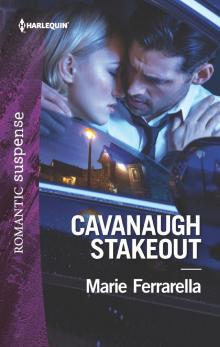 Cavanaugh Stakeout
Cavanaugh Stakeout The Late Bloomer's Road to Love
The Late Bloomer's Road to Love Colton 911--The Secret Network
Colton 911--The Secret Network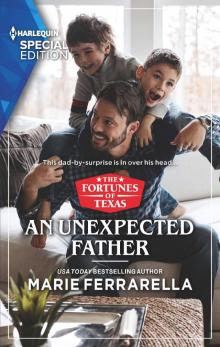 An Unexpected Father
An Unexpected Father The Lawman's Romance Lesson (Forever, Tx. Series Book 20)
The Lawman's Romance Lesson (Forever, Tx. Series Book 20) Coming to a Crossroads
Coming to a Crossroads Colton 911: Cowboy's Rescue
Colton 911: Cowboy's Rescue Summer of Love
Summer of Love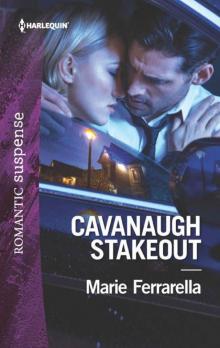 Cavanaugh Stakeout (Cavanaugh Justice Book 41)
Cavanaugh Stakeout (Cavanaugh Justice Book 41) Texan Seeks Fortune
Texan Seeks Fortune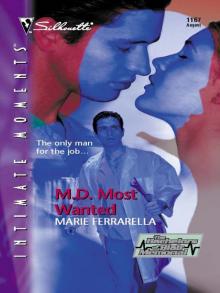 M.D. Most Wanted
M.D. Most Wanted Cavanaugh In Plain Sight (Cavanaugh Justice Book 42)
Cavanaugh In Plain Sight (Cavanaugh Justice Book 42) The Law and Ginny Marlow
The Law and Ginny Marlow Bridesmaid for Hire
Bridesmaid for Hire A Match for the Doctor
A Match for the Doctor The Sheriff’s Christmas Surprise
The Sheriff’s Christmas Surprise Colton's Secret Service
Colton's Secret Service A WEDDING FOR CHRISTMAS
A WEDDING FOR CHRISTMAS A Cavanaugh Christmas
A Cavanaugh Christmas Cavanaugh Fortune
Cavanaugh Fortune The 39-Year-Old Virgin
The 39-Year-Old Virgin Coming To A Crossroads (Matchmaking Mamas Book 24)
Coming To A Crossroads (Matchmaking Mamas Book 24) Cavanaugh's Missing Person
Cavanaugh's Missing Person Cavanaugh on Call
Cavanaugh on Call The M.D.'s Surprise Family
The M.D.'s Surprise Family Angus's Lost Lady
Angus's Lost Lady Her Red-Carpet Romance
Her Red-Carpet Romance Choices (A Woman's Life)
Choices (A Woman's Life) Prescription for Romance
Prescription for Romance A Perfectly Imperfect Match (Matchmaking Mamas)
A Perfectly Imperfect Match (Matchmaking Mamas)![[Kate's Boys 04] - Travis's Appeal Read online](http://i1.bookreadfree.com/i/03/21/kates_boys_04_-_traviss_appeal_preview.jpg) [Kate's Boys 04] - Travis's Appeal
[Kate's Boys 04] - Travis's Appeal Secret Agent Affair
Secret Agent Affair The Cowboy's Lesson in Love
The Cowboy's Lesson in Love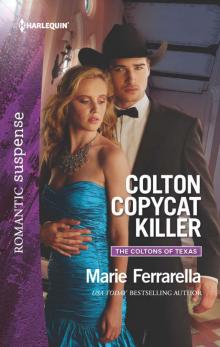 Colton Copycat Killer
Colton Copycat Killer A Small Fortune
A Small Fortune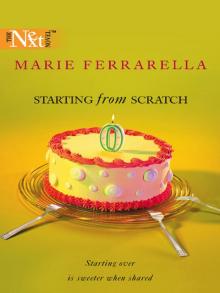 Starting from Scratch
Starting from Scratch Her Forever Cowboy
Her Forever Cowboy Colton Showdown
Colton Showdown Crime and Passion
Crime and Passion The Heart of a Ruler
The Heart of a Ruler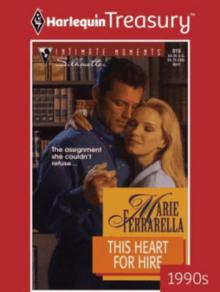 This Heart for Hire
This Heart for Hire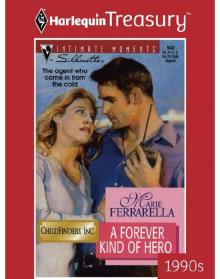 A Forever Kind of Hero
A Forever Kind of Hero Special Agent's Perfect Cover
Special Agent's Perfect Cover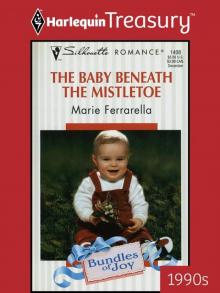 The Baby Beneath the Mistletoe
The Baby Beneath the Mistletoe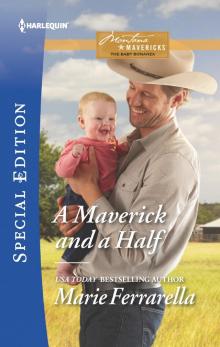 A Maverick and a Half
A Maverick and a Half The Doctor's Guardian
The Doctor's Guardian Cavanaugh Undercover
Cavanaugh Undercover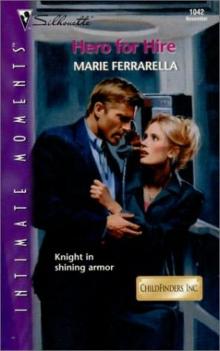 Hero for Hire
Hero for Hire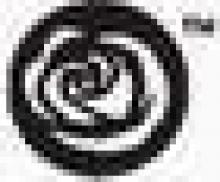 Fortune's Heirs: Reunion
Fortune's Heirs: Reunion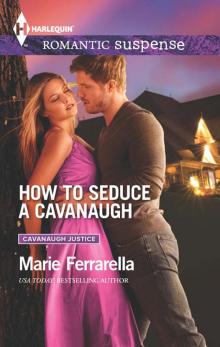 How to Seduce a Cavanaugh
How to Seduce a Cavanaugh The Heiress’s 2-Week Affair
The Heiress’s 2-Week Affair Twice a Hero, Always Her Man
Twice a Hero, Always Her Man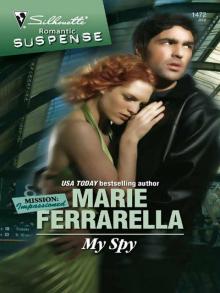 My Spy
My Spy An Engagement for Two
An Engagement for Two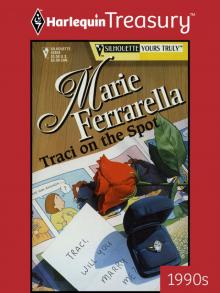 Traci On The Spot
Traci On The Spot Carrying His Secret
Carrying His Secret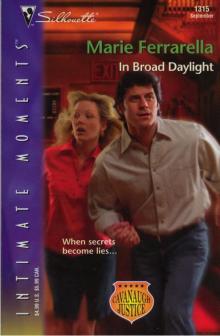 In Broad Daylight
In Broad Daylight Cavanaugh Cold Case
Cavanaugh Cold Case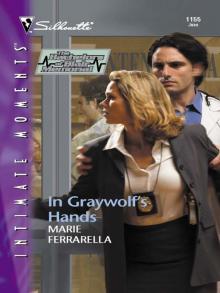 In Graywolf’s Hands
In Graywolf’s Hands The Baby Mission
The Baby Mission Real Vintage Maverick
Real Vintage Maverick Twins on the Doorstep
Twins on the Doorstep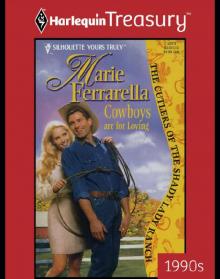 Cowboys Are For Loving
Cowboys Are For Loving Heart of a Hero
Heart of a Hero The Cowboy's Christmas Surprise
The Cowboy's Christmas Surprise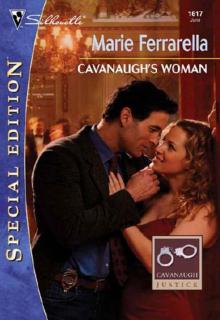 Cavanaugh’s Woman
Cavanaugh’s Woman Sundays Are for Murder
Sundays Are for Murder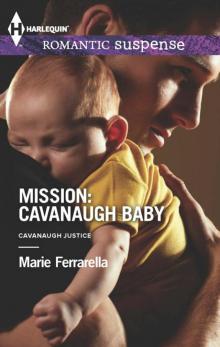 Mission: Cavanaugh Baby
Mission: Cavanaugh Baby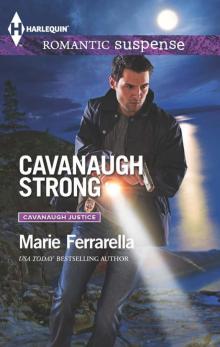 Cavanaugh Strong
Cavanaugh Strong Wish Upon a Matchmaker
Wish Upon a Matchmaker Dangerous Games
Dangerous Games What the Single Dad Wants...
What the Single Dad Wants... Rough Around the Edges
Rough Around the Edges Cavanaugh Judgment
Cavanaugh Judgment Cavanaugh Watch
Cavanaugh Watch Cavanaugh's Secret Delivery
Cavanaugh's Secret Delivery The Pregnant Colton Bride
The Pregnant Colton Bride Let's Get Mommy Married
Let's Get Mommy Married Searching for Cate
Searching for Cate A Forever Christmas
A Forever Christmas Dangerous Disguise
Dangerous Disguise Mac’s Bedside Manner
Mac’s Bedside Manner Cavanaugh Pride
Cavanaugh Pride The Fortune Most Likely To...
The Fortune Most Likely To... Internal Affair
Internal Affair A Second Chance for the Single Dad
A Second Chance for the Single Dad The Cavanaugh Code
The Cavanaugh Code Sapphire and Shadow (A Woman's Life)
Sapphire and Shadow (A Woman's Life)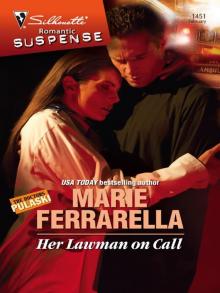 Her Lawman on Call
Her Lawman on Call A Dad At Last
A Dad At Last Her Right-Hand Cowboy (Forever, Tx Series Book 21)
Her Right-Hand Cowboy (Forever, Tx Series Book 21) Cavanaugh Heat
Cavanaugh Heat![[Ladera by the Sea 01] - A Wedding for Christmas Read online](http://i1.bookreadfree.com/i1/03/27/ladera_by_the_sea_01_-_a_wedding_for_christmas_preview.jpg) [Ladera by the Sea 01] - A Wedding for Christmas
[Ladera by the Sea 01] - A Wedding for Christmas Lassoing the Deputy
Lassoing the Deputy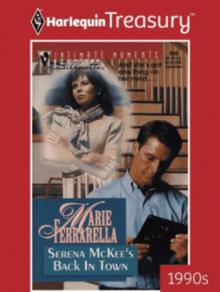 Serena Mckee's Back In Town
Serena Mckee's Back In Town A Baby on the Ranch: A Baby on the RanchRamona and the Renegade
A Baby on the Ranch: A Baby on the RanchRamona and the Renegade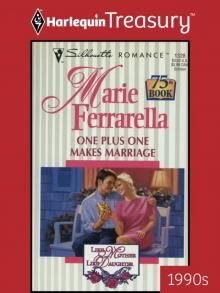 One Plus One Makes Marriage
One Plus One Makes Marriage Protecting His Witness
Protecting His Witness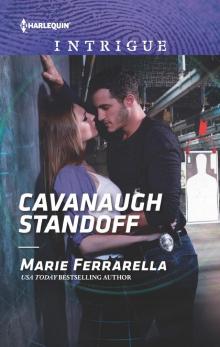 Cavanaugh Standoff
Cavanaugh Standoff The Baby Came C.O.D.
The Baby Came C.O.D. The Setup
The Setup Texas Rose
Texas Rose Three Marie Ferrarella Romances Box Set One
Three Marie Ferrarella Romances Box Set One The Lawman's Romance Lesson
The Lawman's Romance Lesson Desperately Seeking Twin...
Desperately Seeking Twin...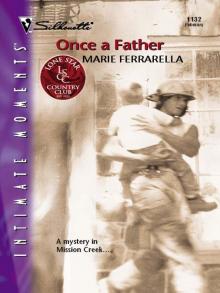 Once a Father
Once a Father![[The Sons of Lily Moreau 02] - Taming the Playboy Read online](http://i1.bookreadfree.com/i/03/25/the_sons_of_lily_moreau_02_-_taming_the_playboy_preview.jpg) [The Sons of Lily Moreau 02] - Taming the Playboy
[The Sons of Lily Moreau 02] - Taming the Playboy Lily and the Lawman
Lily and the Lawman Cavanaugh's Surrender
Cavanaugh's Surrender The Cowboy and the Lady
The Cowboy and the Lady Innkeeper's Daughter
Innkeeper's Daughter A Bachelor and a Baby
A Bachelor and a Baby![[The Sons of Lily Moreau 03] - Capturing the Millionaire Read online](http://i1.bookreadfree.com/i1/03/31/the_sons_of_lily_moreau_03_-_capturing_the_millionaire_preview.jpg) [The Sons of Lily Moreau 03] - Capturing the Millionaire
[The Sons of Lily Moreau 03] - Capturing the Millionaire Because a Husband Is Forever
Because a Husband Is Forever Diamond in the Rough
Diamond in the Rough The Doctor's Forever Family
The Doctor's Forever Family A Lawman for Christmas
A Lawman for Christmas Cavanaugh Rules: Cavanaugh RulesCavanaugh Reunion
Cavanaugh Rules: Cavanaugh RulesCavanaugh Reunion Baby Times Two
Baby Times Two![[The Sons of Lily Moreau 01] - Remodeling the Bachelor Read online](http://i1.bookreadfree.com/i1/04/02/the_sons_of_lily_moreau_01_-_remodeling_the_bachelor_preview.jpg) [The Sons of Lily Moreau 01] - Remodeling the Bachelor
[The Sons of Lily Moreau 01] - Remodeling the Bachelor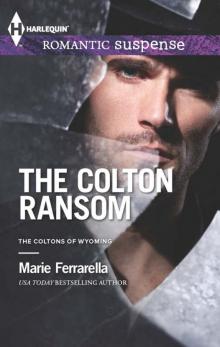 The Colton Ransom
The Colton Ransom Mendoza's Secret Fortune
Mendoza's Secret Fortune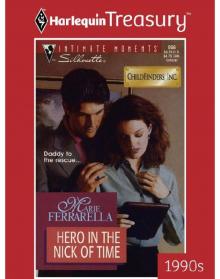 Hero in the Nick of Time
Hero in the Nick of Time![[Kate's Boys 03] - Mistletoe and Miracles Read online](http://i1.bookreadfree.com/i1/04/02/kates_boys_03_-_mistletoe_and_miracles_preview.jpg) [Kate's Boys 03] - Mistletoe and Miracles
[Kate's Boys 03] - Mistletoe and Miracles The Man Who Would Be Daddy
The Man Who Would Be Daddy Fortune's Second-Chance Cowboy
Fortune's Second-Chance Cowboy Coming Home for Christmas
Coming Home for Christmas Her Special Charm
Her Special Charm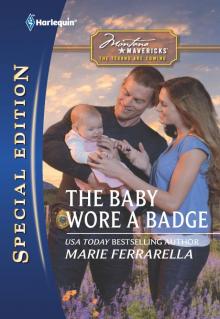 The Baby Wore a Badge
The Baby Wore a Badge Perfect Wyoming Complete Collection: Special Agent's Perfect Cover ; Rancher's Perfect Baby Rescue ; A Daughter's Perfect Secret ; Lawman's Perfect Surrender ; The Perfect Outsider ; Mercenary's Perfect Mission
Perfect Wyoming Complete Collection: Special Agent's Perfect Cover ; Rancher's Perfect Baby Rescue ; A Daughter's Perfect Secret ; Lawman's Perfect Surrender ; The Perfect Outsider ; Mercenary's Perfect Mission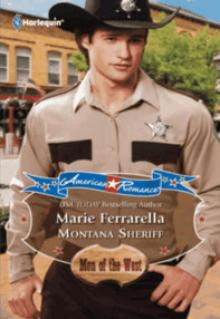 Montana Sheriff
Montana Sheriff Fiona And The Sexy Stranger
Fiona And The Sexy Stranger Military Man
Military Man Dating for Two (Matchmaking Mamas)
Dating for Two (Matchmaking Mamas) Cavanaugh Encounter
Cavanaugh Encounter In His Protective Custody
In His Protective Custody A Small Town Thanksgiving
A Small Town Thanksgiving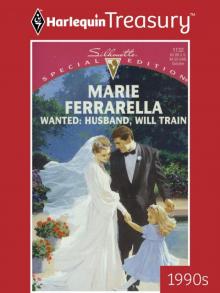 Wanted: Husband, Will Train
Wanted: Husband, Will Train Suddenly...Marriage!
Suddenly...Marriage! Plain Jane and the Playboy
Plain Jane and the Playboy Private Justice
Private Justice The Strong Silent Type
The Strong Silent Type Christmas Cowboy Duet
Christmas Cowboy Duet Flash and Fire
Flash and Fire Colton by Marriage
Colton by Marriage Fortune's Valentine Bride
Fortune's Valentine Bride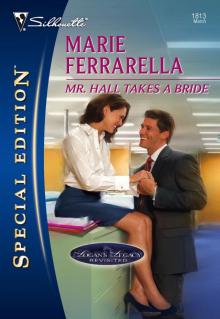 Mr. Hall Takes a Bride
Mr. Hall Takes a Bride Her Good Fortune
Her Good Fortune The Disenchanted Duke
The Disenchanted Duke Beauty and the Baby
Beauty and the Baby Cavanaugh Vanguard
Cavanaugh Vanguard In Bed with the Badge
In Bed with the Badge My Phony Valentine
My Phony Valentine The Rancher and the Baby
The Rancher and the Baby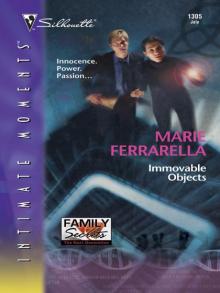 Immovable Objects
Immovable Objects Cavanaugh Reunion
Cavanaugh Reunion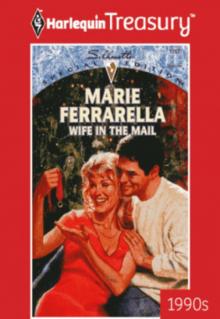 Wife in the Mail
Wife in the Mail A Hero in Her Eyes
A Hero in Her Eyes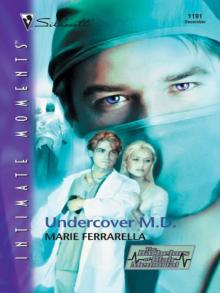 Undercover M.D.
Undercover M.D. Colton Undercover
Colton Undercover Found: His Perfect Wife
Found: His Perfect Wife Dr. Forget-Me-Not (Matchmaking Mamas)
Dr. Forget-Me-Not (Matchmaking Mamas) Loving the Right Brother
Loving the Right Brother Holiday in a Stetson: The Sheriff Who Found ChristmasA Rancho Diablo Christmas
Holiday in a Stetson: The Sheriff Who Found ChristmasA Rancho Diablo Christmas Colton Baby Rescue
Colton Baby Rescue Baby's First Christmas
Baby's First Christmas LASSOED BY FORTUNE
LASSOED BY FORTUNE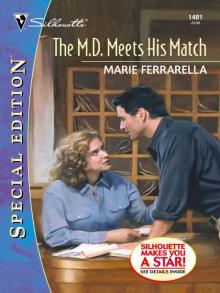 The M.D. Meets His Match
The M.D. Meets His Match A Baby for Christmas
A Baby for Christmas His Forever Valentine
His Forever Valentine The Inheritance
The Inheritance The Woman Who Wasn't There
The Woman Who Wasn't There![[Kate's Boys 05] - A Lawman for Christmas Read online](http://i1.bookreadfree.com/i2/04/09/kates_boys_05_-_a_lawman_for_christmas_preview.jpg) [Kate's Boys 05] - A Lawman for Christmas
[Kate's Boys 05] - A Lawman for Christmas Husbands and Other Strangers
Husbands and Other Strangers A Match for Morgan
A Match for Morgan The Doctor's Guardian & Tempted By His Target
The Doctor's Guardian & Tempted By His Target The Offer She Couldn't Refuse
The Offer She Couldn't Refuse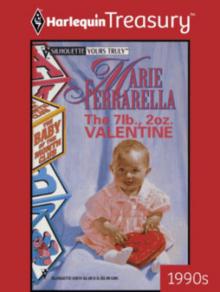 The 7 Lb., 2 Oz. Valentine
The 7 Lb., 2 Oz. Valentine Fixed Up with Mr. Right?
Fixed Up with Mr. Right?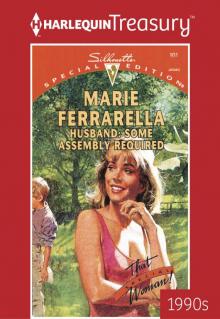 Husband: Some Assembly Required
Husband: Some Assembly Required Adding Up to Family
Adding Up to Family Cavanaugh or Death
Cavanaugh or Death Unwrapping the Playboy
Unwrapping the Playboy Becoming a Cavanaugh
Becoming a Cavanaugh Racing Against Time
Racing Against Time Christmastime Courtship
Christmastime Courtship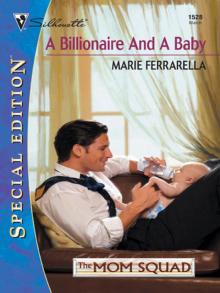 A Billionaire and a Baby
A Billionaire and a Baby Ten Years Later...
Ten Years Later... Cavanaugh on Duty
Cavanaugh on Duty Cavanaugh Hero
Cavanaugh Hero Finding Happily-Ever-After
Finding Happily-Ever-After The Prodigal M.D. Returns
The Prodigal M.D. Returns Mendoza's Secret Fortune (The Fortunes of Texas: Cowboy Country)
Mendoza's Secret Fortune (The Fortunes of Texas: Cowboy Country) Once Upon a Matchmaker
Once Upon a Matchmaker Diamond in the Ruff (Matchmaking Mamas Book 13)
Diamond in the Ruff (Matchmaking Mamas Book 13) Fortune's Just Desserts
Fortune's Just Desserts![[Kate's Boys 02] - The Bride With No Name Read online](http://i1.bookreadfree.com/i2/04/10/kates_boys_02_-_the_bride_with_no_name_preview.jpg) [Kate's Boys 02] - The Bride With No Name
[Kate's Boys 02] - The Bride With No Name The Agent's Secret Baby
The Agent's Secret Baby Doctoring the Single Dad
Doctoring the Single Dad Stand-In Mom
Stand-In Mom Diamonds and Deceptions
Diamonds and Deceptions The Bride Wore Blue Jeans
The Bride Wore Blue Jeans The Amnesiac Bride
The Amnesiac Bride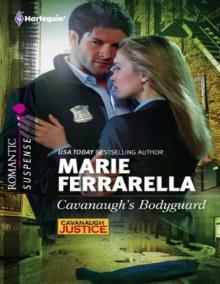 Cavanaugh's Bodyguard
Cavanaugh's Bodyguard Brooding Angel
Brooding Angel The Once and Future Father
The Once and Future Father Cavanaugh in the Rough
Cavanaugh in the Rough Mother in Training
Mother in Training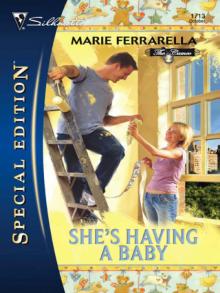 She’s Having a Baby
She’s Having a Baby Never Too Late For Love
Never Too Late For Love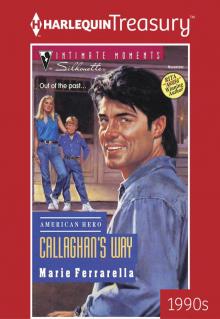 Callaghan's Way
Callaghan's Way Happy New Year--Baby!
Happy New Year--Baby! Diagnosis: Danger
Diagnosis: Danger Your Baby Or Mine?
Your Baby Or Mine? The Maverick's Return
The Maverick's Return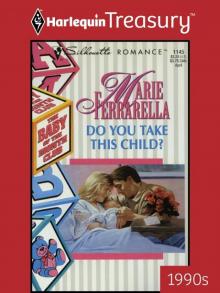 Do You Take This Child?
Do You Take This Child? The Women in Joe Sullivan's Life
The Women in Joe Sullivan's Life The Second Time Around
The Second Time Around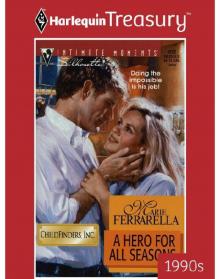 A Hero for All Seasons
A Hero for All Seasons